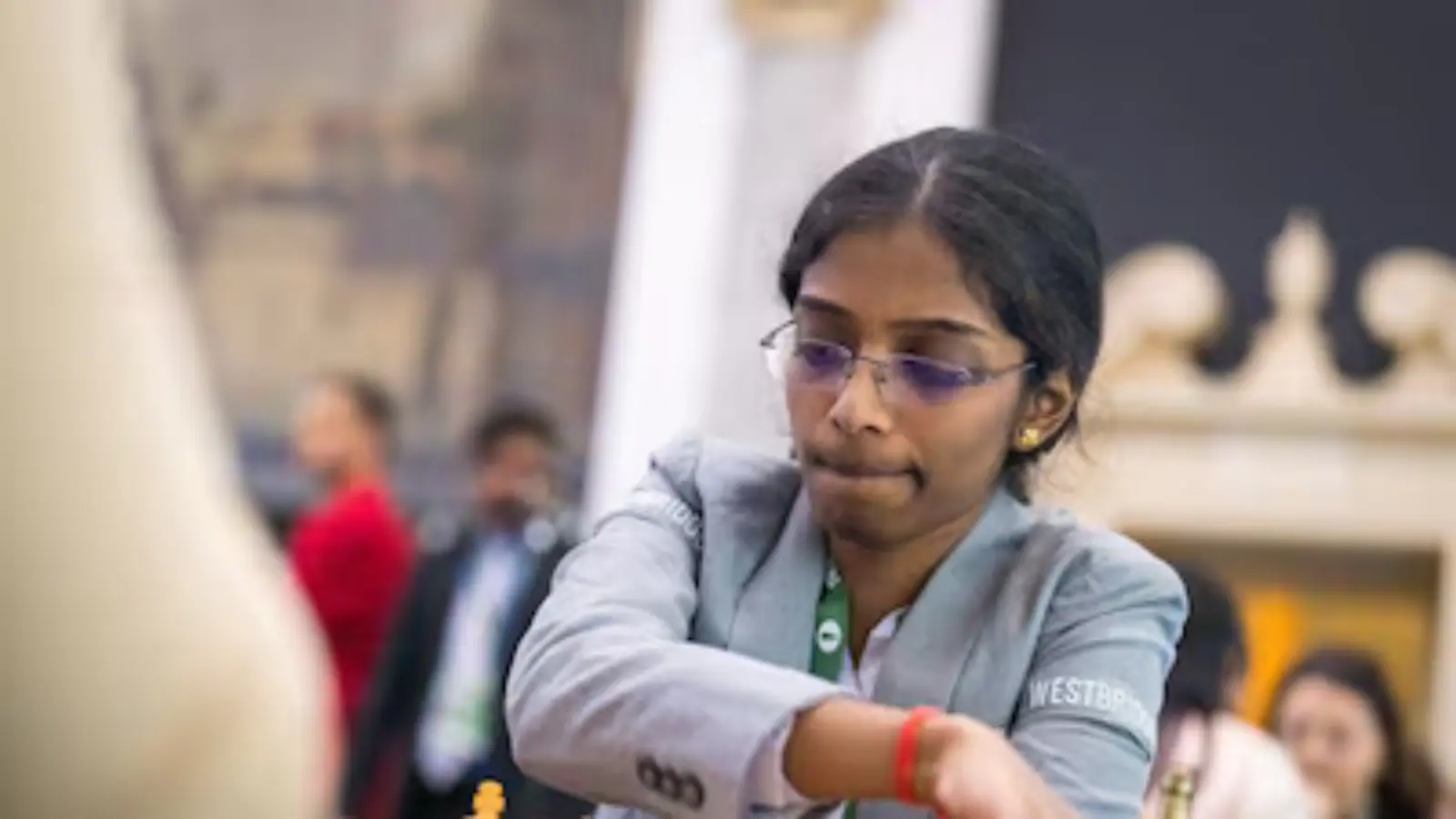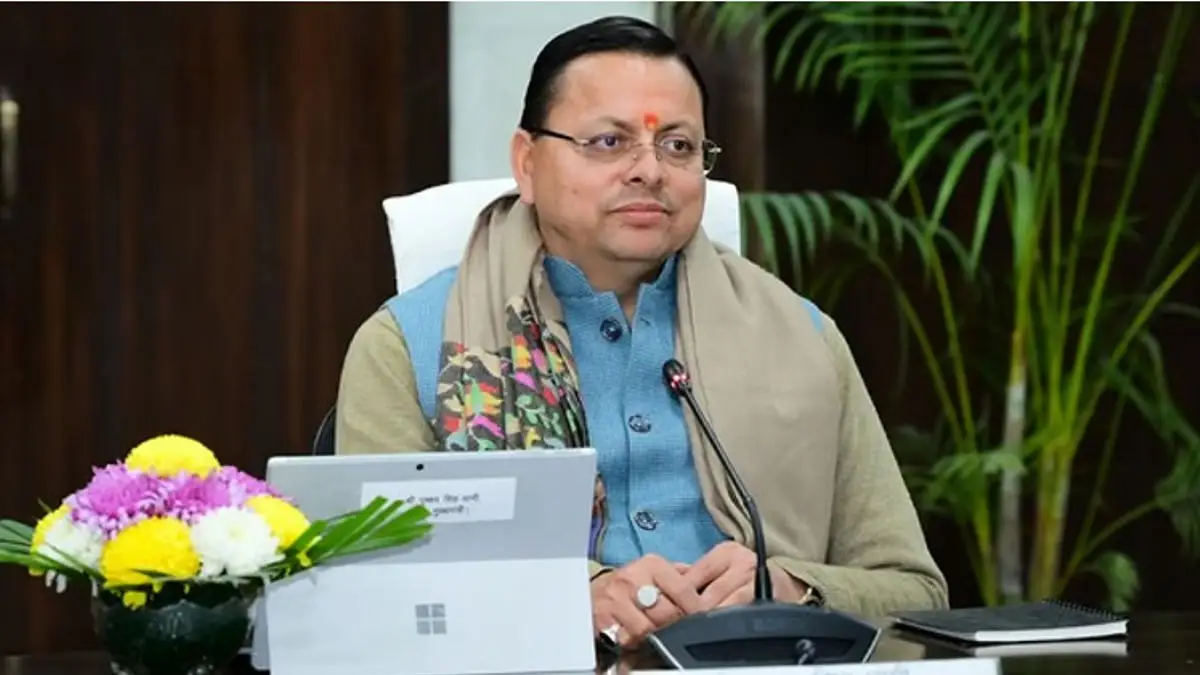By Akhileshwar Sahay,News18
Copyright news18

Only a couple of weeks before one of the most prestigious FIDE Grand Swiss chess tournaments got underway in the historic city of Samarkand in Uzbekistan, known for its rich history as a crossroads on the Silk Road, Grandmaster R Vaishali finished 10th, the last position in the Chennai Challengers tournament. She also lost 24 crucial rating points in the process. That was then.
On Monday, 13 September, it was a different Vaishali smiling with triple delight on the chessboard. What Vaishali achieved at Samarkand was an unprecedented triple triumph.
Crowned Queen
She was crowned Queen of the Women’s section of the prestigious Grand Swiss tournament after lifting the winner’s trophy aloft. In the final round, she clinched the title with a hard-fought draw against Tan Zhongyi, China’s world championship finalist.
Though Vaishali finished with 8 points out of a maximum 11, the same as 4th seed Kateryna Lagno of Russia, the 24-year-old, only the third Indian to become a Grandmaster, was declared winner of the tournament because she had played against stronger opponents, with an average Elo rating of 2434 versus Lagno’s 2433.
Vaishali’s performance is all the more creditable not only because she came straight from a disappointing last-place showing in the Chennai Challengers tournament, but also because she was ranked a lowly 13th in the Grand Swiss tournament.
A Class Apart
Creditably, Vaishali stamped her class with back-to-back wins in this prestigious and tricky FIDE tournament. Earlier in 2023, she became the surprise winner of the Grand Swiss crown, where she also clinched her fourth and final Grandmaster norm. Now, by clinching the 2025 crown consecutively, she has shown the chess pundits of the world that she is a class apart. Until now, no chess player — across categories, open or women’s section — had won back-to-back Grand Swiss titles.
Over To Candidates
By winning the Grand Swiss, Vaishali also secured a ticket to next year’s hallowed Candidates Tournament, making it two times in a row. In the 2024 Candidates Tournament in Toronto, she was the only Indian in the women’s section, while three Indians — D Gukesh, R Praggnanandhaa, and Vidit Gujrathi — played in the open section, which was won by D Gukesh, who eventually became World Champion in Singapore.
Rise And Rise
With Vaishali now joining the fray, India will have at least three participants in the women’s section out of a total of eight in next year’s Candidates Tournament. Two months ago, Divya Deshmukh and Koneru Humpy had advanced to the Candidates after becoming champion and runner-up respectively in the FIDE Women’s World Cup 2025.
The winner of the 2026 Women’s Candidates will play in the World Championship match against China’s Ju Wenjun, who has won the ultimate title five times.
This remarkable show of Indian firepower marks the rise and rise of women’s chess in India in an arena where the top 10 ranks in the classical FIDE rating list are dominated by Chinese players, with Koneru Humpy being the only Indian among them. Five Chinese women occupy the top five spots in the FIDE women’s ratings: Hou Yifan (world no. 1 at 2607), Ju Wenjun (no. 2 at 2570), Lei Tingjie (no. 3 at 2565), Tan Zhongyi (no. 4 at 2539), and Zhu Jiner (no. 5 at 2536).
Seven Spots Sealed
Seven of the eight spots for the upcoming Women’s Candidates have now been sealed. While Divya, Humpy, and Tan Zhongyi qualified by being the top three finishers in the FIDE Women’s World Cup 2025, Zhu Jiner and Aleksandra Goryachkina qualified as the winner and runner-up, respectively, of the FIDE Women’s Grand Prix 2024–25 cycle. Lagno also qualified alongside Vaishali for the eight-player event by being placed second in the 2025 Grand Swiss.
Now, only the final spot has been reserved for a player through the FIDE Women’s Events 2024–25, which will be decided later based on performance across various tournaments. Will D. Harika, the 12th-ranked Indian on the FIDE circuit, make the cut? Maybe, maybe not. But if she does, there will be four Indian women out of eight in the 2026 Candidates.
It is time to put in perspective the spectacular achievement of India’s trio, Vaishali, Divya, and Humpy, as they head to the 2026 Candidates. In 2024, three Indians — D. Gukesh, R. Praggnanandhaa, and Vidit Gujrathi — landed in the Toronto Candidates. And there was only one R. Vaishali in the Women’s Section at Toronto in 2024
This time, not a single male player from India has yet confirmed a spot for the Candidates 2026, while a record number of three have already booked their ticket to next year’s women’s Candidates Tournament.
Even in the Open section, the situation may change, as there are still five more spots up for grabs. So far, only Fabiano Caruana, Anish Giri, and Matthias Blübaum have qualified. Based on current performance, at least one Indian, Praggnanandhaa, is in an extremely comfortable position to qualify for the Candidates. And if he does, just like in 2024 at Toronto, there will once again be a brother-sister duo in the 2026 Candidates, rooting for each other.
The Swiss format of the FIDE Grand Swiss is notoriously tricky; you are unaware of your next opponent and are bound to face only in-form players on equal terms, as winners play winners after each round. Vaishali triumphed in this unpredictable format, where in every round until the very end, she had no idea who her next opponent would be.
Full marks go to Vaishali, who, despite being the 2023 champion, was the dark horse this year. Seeded 13th, she was not the favourite to become Queen.
Magnificent
FIDE President Arkady Dvorkovich called the tournament “a truly magnificent event”. Congratulating the four qualifiers, Giri, Blübaum, Vaishali, and Lagno, he praised the tournament’s strength and drama. “Not only was this the strongest line-up of all the Grand Swiss tournaments so far, but it brought the most drama, with leadership ties and uncertainty well into the last round,” he said.
Pathway To The Summit At Samarkand
Given the above, Vaishali’s triumph and her scaling of the summit at Samarkand has been truly creditworthy. Her Grand Swiss victory makes it emphatically clear that Indian women are on course to match, and possibly outshine, the performances of their male counterparts.
But how did Vaishali reach the point she did at Samarkand?
Here is the story in brief: Vaishali won six games, lost one, and drew the remaining four. Her tie-break, based on the average rating of opponents, proved to be just one point higher than Lagno’s. So, it was a combination of great preparation, sustained momentum, consistency of the highest order, and a bit of luck that helped her scale the summit.
Becoming Of Vaishali
A question arises at this point: when did Vaishali’s chess journey begin, and how did she reach where she stands today? Here goes the story of the making of R Vaishali.
Born on 21 June 2001 in Chennai, Vaishali Rameshbabu began playing chess at the age of six. Her prowess came into the limelight in 2012 when she won the U-12 Girls’ World Youth Chess Championship, followed by a U-14 triumph in 2015. When she was 12, with a FIDE rating of about 2000, she played in a simultaneous exhibition against GM Magnus Carlsen, and sensationally beat him. Carlsen went on to become World Champion soon after.
Vaishali earned her WGM title in 2018, achieving her final norm at the Riga Technical University Open. Her IM title followed in 2021. In fact, Vaishali earned four norms for the title, one more than required, having secured two of them rapidly in July and August 2021.
In the 2020 Women’s Speed Chess Championship, she finished eighth out of 22 participants. After a first-round exit in 2021, she made a strong comeback in 2022, reaching the semi-finals after defeating IM Bibisara Assaubayeva and GM Harika Dronavalli in the opening rounds.
Vaishali came of age in 2023 when she won the FIDE Women’s Grand Swiss with a score of 8.5/11, thus qualifying for the 2024 Candidates, just months after her brother did so at the 2023 FIDE World Cup.
Earlier that year, at the Qatar Masters Open, Vaishali scored 5/9, earning her final GM norm while also winning the women’s prize. At the conclusion of the Grand Swiss, she needed only three more rating points on the live list to officially achieve the Grandmaster title — and she secured them at the Llobregat Open in Spain on 1 December 2023.
Fast forward to the 2024 Candidates in Toronto: Vaishali played fighting chess and finished in a tie for second place, with six wins, five losses, and just three draws. Later that year, she played on second board for India at the 45th Chess Olympiad and won gold.
Consistency has not always been Vaishali’s strongest forte, but she is a dogged fighter who excels when it matters most. At the last Candidates, despite losing four games in a row, she fought back brilliantly, winning five straight games to finish joint second.
Now, she is off with flying colours to her second Candidates Tournament in a row. The sky is the limit if she plays her best chess and has a bit of luck on her side. Well done, R Vaishali.
The author is a multidisciplinary thought leader with Action Bias, India-based international impact consultant, and keen watcher of changing national and international scenarios. He works as president, advisory services of consulting company BARSYL. Views expressed in the above piece are personal and solely those of the author. They do not necessarily reflect News18’s views.



